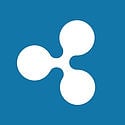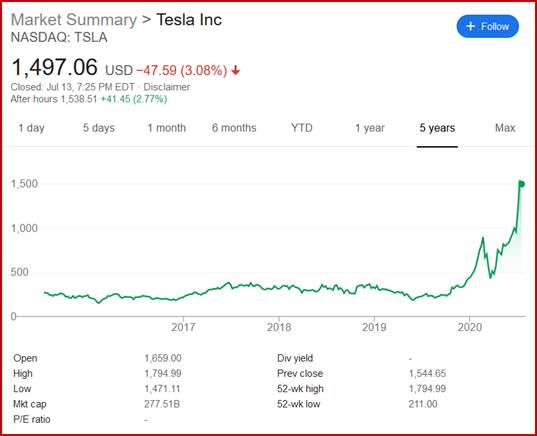Outlook:
We get inflation data today. Let's not waste any time on it.
Earnings reports from JPMorgan, Citi and Wells Fargo today may set the tone for the stock market. We already know Wells Fargo is the only big bank not allowed to offer a dividend, but this is due to gigantic fines for misconduct as much as any judgment on its loan loss reserves. Banks are awfully good at disguising conditions, chiefly by inventing new names and burying unhappy outcomes in dense footnotes.
So far we have the JPMorgan results, with earnings down to about half in Q2 as the year before ($4.7 billion), but more than offset by a giant rise in revenue, $34 billion vs. $29 billion the year before. The NYT reports "The increase was thanks to a surge in its Wall Street businesses, where a record haul of $16 billion represented a 66 percent increase from last year." This means trading revenue. Mr. Dodd and Mr. Frank would not be pleased. The loan loss reserve was increased to almost $11 billion, $9 billion more than last year. We find it interesting that two thirds of the new loan loss measure is targeted to consumers, including credit cards, not businesses. Does this imply JPMorgan has such a high-quality business loan portfolio it foresees small defaults? Not that $3 billion is exactly small but it's an interesting set of amounts.
Yesterday we had the weird and uncomfortable situation of the dollar rising against the other safe-haven currencies, the Swiss and yen, plus driving the AUD and CAD down all day, when commodities and commodity currencies are the leading edge of the bottom-is-in recovery sentiment. The peso fell, too (although to an easily-drawn support line). And yet the euro was firm against the dollar as it was against the pound, if seeing profit-taking against the yen after a big buildup. We guess this disparate performance means a tendency to risk-off and the dollar as safe-haven again, except against the euro. Huh?
It appears the euro is less responsive to general risk-on/risk-off sentiment as seen in the US equity markets and the dollar against other currencies. We have no explanation for the euro's seeming immunity, which may well be aberrant and temporary.
One possibility is that the Bank of England is toying with the idea of negatives rates while the ECB is already there. Another is that the mountain of regulations and red tape looming in the hard Brexit is going to harm the UK more than it will harm Europe, although this is not a known unknown. Europeans can excel at red tape, too. Then there is the superior response to the pandemic on the Continent compared to the UK.
Finally, we ignore Merkel at our peril. As the long-time leader in the eurozone and joined by the self-appointed new leader, France's Macron, Merkel has been promoting this week's summit on the overall financial response to the pandemic. She has street cred as well as logic and data. Remember she is the one who told Trump to go pound sand when he proposed the G7 summit at Mar-a-Lago and wanted to invite Russia back in. This time she has stiffened the backbone of those favoring the €750 billion recovery budget and warned that it's a big problem and calls for a big response (so don't even think about reducing the amount). Yesterday she said that if this summit doesn't get the job done, a second summit might be needed. In other words, straighten up and get to work. The euro might have some serious underlying support on the expectation that the rescue fund will proceed despite the objections of the Frugal Four.
Maybe there is some underlying expectation that the ECB will come up with som when it comes to China ething new this week. There is also some sense that the China "cold war" will affect Europe less than others, although it is still forming. Foreign Policy magazine ran a story indicating Europe is increasingly divorcing itself from the US when it comes to China. Despite various fights China is picking with Europe, "... Europe is hedging. It is currently in negotiations with Beijing on a comprehensive investment agreement and joint measures to combat climate change. Clinching these deals is a long shot. But if it does come together, just as the U.S. election is taking place, it will send another signal that the United States is losing Europe on its No. 1 foreign-policy priority: China."
We need to worry about attributing the euro's mysterious firmness to political reasons, although many political effects can bind together to form economic consequences. From this side of the Atlantic, €750 billion is small potatoes compared to the US' $3 trillion (and more to come), but if you are sitting in Rome, Madrid or Athens, it's plenty.
It would be nice if all the major financial press outlets were to resume interviewing Big Bank traders, but that vanished about five years ago for unknown reasons. We guess the Big Banks decided there might be some liability lurking in those comments by "chief currency strategists" that outweighed the prestige from being named in the WSJ, FT, Bloomberg and Reuters, plus lesser news outlets like the now nearly defunct Market News International. It's a pity because we got some useful clues from those comments. Now we are stuck with economists and independent analysts, who brag they have six years of experience, as though that's impressive.
In practice, without professionals disclosing the lines they are thinking along, we are all guessing and trying to read the mind of the market. But decades of experience teach us what lines of thought are likely to be fruitful and which are just noise. A really good example is how to think about the European rescue fund. Newcomers are neglecting it—and Merkel's role--and focusing on the delays and squabbles. Old-timers know better. The deal is almost certain to get done, even if it gets kicked down the road at least one more time. How do we know? Merkel said it must get done. Remember she didn't take that stance when the issue was Grexit, and that lasted a far longer time and involved many kicks down the road. Even if the deal getting done is already being priced in, the announcement effect can still be substantial.
What upends this point of view is the possibility that the US stock market nosedives on the new spread of Covid-19 and more lockdowns in the US, especially in the absence of that next spending plan from Congress. That can turn the dollar into the safe-haven again even when the underlying cause of a need for a safe haven comes, perversely, from its issuing country. We don't see it on the horizon today, but keep your bets small.
Tidbit: While the S&P and Dow sometimes get freaked out by pandemic news or overly bubbly on some wishful thought or another (vaccines, for example), quite often the Nasdaq goes its own merry way. We are certainly not an expert (actually, experts are befuddled, too), but the Tesla story must be a classic lesson in foolishness and greed, aka animal spirits. Yesterday, a speculative frenzy pushed Tesla higher by over 16% for more than 300% year-to-date and 100% in the past month alone. See the chart; Tesla has no P/E ratio because it has practically no earnings, at least not consistently. It also pays no dividends, for the same reason. One analysis notes Tesla has never made a profits for four quarters in a row, making it ineligible for the S&P. Bloomberg writes "Tesla is priced at 6,348 times its last year's earnings [and] the stock is priced at 166 times next year's earnings, 20 times book value, and seven times sales."
This is not to say Tesla or the Nasdaq or the US stock market in general has reached some peak of insanity and the next move must be a crash. But when all reason and standards have been thrown out the window, it's time to head for the door.
This is an excerpt from “The Rockefeller Morning Briefing,” which is far larger (about 10 pages). The Briefing has been published every day for over 25 years and represents experienced analysis and insight. The report offers deep background and is not intended to guide FX trading. Rockefeller produces other reports (in spot and futures) for trading purposes.
To get a two-week trial of the full reports plus traders advice for only $3.95. Click here!
This morning FX briefing is an information service, not a trading system. All trade recommendations are included in the afternoon report.
Recommended Content
Editors’ Picks
EUR/USD regains traction, recovers above 1.0700

EUR/USD regained its traction and turned positive on the day above 1.0700 in the American session. The US Dollar struggles to preserve its strength after the data from the US showed that the economy grew at a softer pace than expected in Q1.
GBP/USD returns to 1.2500 area in volatile session

GBP/USD reversed its direction and recovered to 1.2500 after falling to the 1.2450 area earlier in the day. Although markets remain risk-averse, the US Dollar struggles to find demand following the disappointing GDP data.
Gold climbs above $2,340 following earlier drop

Gold fell below $2,320 in the early American session as US yields shot higher after the data showed a significant increase in the US GDP price deflator in Q1. With safe-haven flows dominating the markets, however, XAU/USD reversed its direction and rose above $2,340.
XRP extends its decline, crypto experts comment on Ripple stablecoin and benefits for XRP Ledger

Ripple extends decline to $0.52 on Thursday, wipes out weekly gains. Crypto expert asks Ripple CTO how the stablecoin will benefit the XRP Ledger and native token XRP.
After the US close, it’s the Tokyo CPI

After the US close, it’s the Tokyo CPI, a reliable indicator of the national number and then the BoJ policy announcement. Tokyo CPI ex food and energy in Japan was a rise to 2.90% in March from 2.50%.
